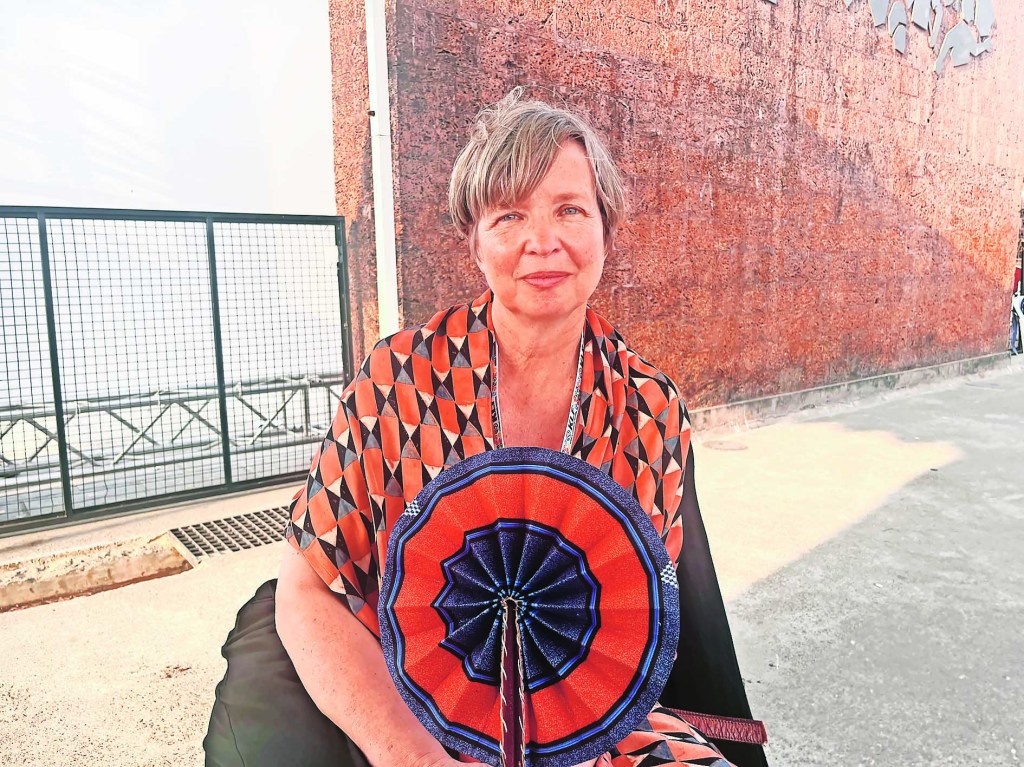German writer Jenny Erpenbeck, the reigning International Booker Prize winner, was a successful opera director before she became a reluctant novelist. Erpenbeck, born in Berlin in erstwhile East Germany, directed several operas until one day a publisher sought the manuscript of her first novel she had kept hidden. Her new novel, Kairos, about the history of fascism, communism and unification of East and West Germany in the story of love and betrayal of a teenager and a middle-aged writer, won the International Booker Prize for translations into English.
In her first visit to India, Erpenbeck talks at the Kerala Literature Festival about her previous works, the art and free speech controversies in Germany, right-wing resurgence across the world, migration and refugees. Edited excerpts:
How did you become a writer?
I come from a family of writers. My grandparents were writers, my father was a writer too and my mother was a translator of Arabic literature into German. Because there were so many writers in the family I tried my best not to become a writer. When I was younger I thought I should find my own way and I studied opera directing and became an opera director. Between my studies and starting to work there was a pause of one year and I thought, okay, I would try to write a story I had in my mind before. Many years later, I had a contact in a publishing house who asked if I had already written something. I took this story out of the drawer and it became my first book. After a while I switched completely to writing.
What were you exploring in your initial works?
Kairos was preceded by nine books. There was The Book of Words, a story I put in an unknown setting without a name. It was a story that I took from Argentina under dictatorship where they took the children of murdered opposition activists, adopted them and brought them up in military families and others. After the dictatorship ended the grandmothers began looking for their grandchildren. The story deals with having the wrong parents who killed your actual parents. Visitation, another novel, is about a house in East Germany near the Poland border and its owners in the course of the 20th century.
What was the point of departure for Kairos? Was the story with you for a long time before it was written?
In a way, yes. I needed some distance. When I was asked about this period (East Germany and the reunification), I always reacted emotionally. I thought I should cool down before writing this novel. When I decided to write, I did some research. It was funny because it was about the time I lived with myself. I was material to myself in a way as someone who lived during this time. It took me 30 years to cool down and another two years to write the book. I wrote it in my home in Berlin. It was published in 2021.
Your family was composed of members of the communist party.
My grandparents were communists, the real ones in the 1920s. They emigrated to the Soviet Union in the 1930s. My parents were also party members. There were many people who wanted to change the system from inside and my parents were among them. In a way they failed. But they tried. There were some smart people in the party who really wanted to make society a better one.
How do you view the contemporary world? You have written about a wall going down in Kairos, but there are many more coming up across the world.
The fall of the Berlin wall is seen as much higher than that of the journeys of the Africans to Europe who are also seeking a life of freedom and democracy. They are crossing the Mediterranean Sea. This is not considered an act of courage and being brave, which it actually is. It is interesting because the fall of the Berlin wall until now is considered as a celebration of Western freedom. This was like, we are saving your souls, you know, we are embracing our brothers and sisters in the East and all that. In fact, it was also just being added to the Western system. Now, when African refugees are fleeing from their countries, it is not the celebration of Western freedom, but a sign of injustices in the world, of climate crisis caused by capitalist societies. The story that is being told by someone fleeing from Africa is different from the story from someone who tried to get over the Berlin wall and in the end made it. It is a different story. I think this makes it less told.
You wrote a novel about refugees in Europe from Africa.
I wrote a whole book on African refugees. It is called Go, Went, Gone in 2015. It was also the year the Syrian refugees first arrived in Europe. But Africans have been there before. There was a moment in time when boats capsized in the Mediterranean sea and people died. And the only thing the German media would say was we are very sorry, but not everybody can come to Europe. I thought it was some kind of an inappropriate reality. So I thought someone from the middle of society, like me, should take time to pay attention to who are these people and what made them flee from home. It is not that they all want to live in Europe. They have a miserable life in Europe. So what is still making them flee from their home countries? I met people from different countries and we became friends and spent a lot of time together. Even now I am dealing with them. Some made it and others didn’t. Some ended up in mental asylums. All the people I spoke with came from different countries—Gambia, Burkina Faso, Ghana. They are different people who came for different reasons.
Why is the refugee situation and migration considered major reasons for right-wing resurgence in Germany and Europe?
Unfortunately, it seems like democracy and dictatorship are coming in waves. I think every generation has to make their bad experience of, perhaps, war and nationalism anew. So there is not much learning from history, as everybody hopes. I can see this right wing tendency in the whole of Europe, also in America. This seems to be a general problem, not only a problem of Germany or our bad fascist tradition. The Left wing people were busy with things that were not that important. We shouldn’t discuss the right words for any gender when we can see that there are so many difficulties for women. As it is now, this is just a mad thing to discuss at times like these and they lost their people, their voters.
How is art and free speech impacted by attempts in Germany to suppress views on Palestine? Among those who were forced to leave their positions was Indian poet Ranjit Hoskote from Documenta 16. The Germany Photography Biennale was cancelled following its co-curator Shahidul Alam’s comments on Palestine.
It is not getting easier. One who writes novels should be someone thinking or mainly looking at the complexities of things, all things together. I am one of these. I would always mention the violence committed by Hamas together with the horrors of this Israeli war against Palestine. You can’t mention one thing as a crime and leave the other out. I would always say I am mourning for the people in Gaza as I am mourning for the people in Israel who lost their lives in the most horrible way. I am mourning the Ukrainian people who are losing their lives as I am also mourning the Russian soldiers who are forced to fight a battle they don’t even know about. I am so sad that human problems even now can’t be solved without bloodshed. But I can see that in societies, aggression and radical opinions are getting stronger and stronger. Even friendships are in danger and families are falling apart because of these discussions. I think this is sad. Perhaps, because I am a woman I can’t understand this kind of stupid male competition between countries and nations, ‘I am proud of this, I am proud of that, this religion is better than the other one’. I am far away from all these. I am so happy to be an atheist.
Is Kairos a way of using a powerful narrative as a warning about what is happening today and what will happen tomorrow unless we heed the warnings from history?
Stark times are coming. We don’t learn from history. So what should I say? If you look at the world you can see what is happening. Nobody is learning anything. In five minutes everybody turns into a soldier or is being made a soldier.
This is your first visit to India. What are your impressions of the country and its literature?
I said no to many many countries (invitations to literary events), but I said yes to India. It is an interesting country. It will be even more interesting when I travel to the north from the south and see the differences. The difference between France and Germany or Spain or other countries in Europe, it is like that in India, but within one country. I have read some (Salman) Rushdie, Raj Kamal Jha, who has a very interesting way of thinking. I am now reading the short version of The Mahabharata by French writer Jean-Claude Carrière translated into German. It is completely surreal.
What is next?
I am going to write a book about my father, which is perhaps non-fiction. I am not sure yet.
Faizal Khan is a freelancer.








